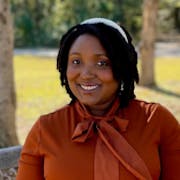5 Ways Caregivers Can Celebrate Young Black Kids

Negative messages about Blackness and physical characteristics more commonly found among Black people are pervasive. Research suggests that children pick up on these messages quite early. This is why caregivers must take a proactive approach to ensure children are exposed to positive messages about Blackness. Black girls, who can potentially internalize negative messages about race and are also targeted by gendered messages about outer appearance, may benefit from specific centering. However, all children benefit from factual information about the beauty of diversity. The following lists five ways that we can celebrate the young Black children in our lives.
1. Affirm their natural hair.
One of the prevailing attitudes in our society is that tightly coiled hair, typically found in Black people, is undesirable, unmanageable, and unpleasant. These ideas can be seen in hair products with before pictures that look kinkier than the after; "crazy hair day" styles that are just afros; and hair straightening products, whether chemical or electronic. Caregivers can help to counter some of this negativity with affirmations specific to kids’ natural hair texture:
Try saying: "Oh, I just love your coils!"
Try saying: "Your puffs are too cute!"
Try saying: "The texture of your hair is beautiful."
Try saying: “You can do so many cool things with your hair!”
2. Teach about the power of melanin.
Another prevailing anti-Black belief is that dark skin is less attractive. Despite the shift to preferring the "tanned" bronzed skin colors in the media, truly dark skin is rarely celebrated. Caregivers can affirm the beauty of Black kids’ skin, just like their hair. In addition, caregivers can also talk about what makes skin dark– melanin– and its powerful role in protecting our skin from damage from the sun!
Explain with a book: All The Colors We Are: The Story of How We Get Our Skin Color.
Explain with a video: Explaining Race.
Explain while engaging in art activities that highlight different skin tones.
3. Infuse positive imagery into their environments.
Caregivers can create environments that positively portray Black kids and Black people in general. An environment filled with positive imagery, from what's hanging on the wall to what is played with, can celebrate them day after day.
Purchase or check out books for read-aloud and to be displayed.
Include dolls and toys (e.g., puzzles and puppets) that feature Black kids in your play area.
Incorporate affirmations that center Blackness in daily life, like this one!
4. Visit affirming spaces.
Children pick up messages about race from many different places. Unfortunately, we cannot always control the spaces our children are in, but when we can, we can make a conscious effort to visit affirming spaces, spaces that at the very least normalize being Black to spaces that overtly celebrate Blackness.
Visit museums like The Black Hair Experience, The Museum for Black Girls, and the virtual Black Children's Book Museum.
Patronize (or window shop) at Black bookstores, coffee and tea shops, and other shops.
Attend local Black cultural festivals.
5. Read quality children's literature that centers Black kids.
A well-written children's book with beautiful illustrations can serve as a portal into a whole new world. Fortunately, there are more and more excellent children's books that center Black children. Sharing the stories in books like this can serve as an invaluable reminder of just how important the young Black kids in your life are to you, to our world, and hopefully to themselves. Below are some of our favorites:
Explore the beauty of Black hair through I Love My Hair by Natasha Tarpley and E.B. Lewis; Hair Love by Matthew Cherry and Vashti Harrison; and Cool Cuts by Mechal Renee Roe.
Highlight the beauty of Black and brown skin tones with Sulwe by Lupita Nyong’o and Vashti Harrison and The Me I Choose to Be by Natasha Tarpley and Regis and Kahran Bethencourt.
Share stories of Black joy and everyday life with books like The Year We Learned to Fly by Jacqueline Woodson and Rafael López; Hands Up! by Breanna J. McDaniel and Shane W. Evans; and Saturday by Oge Mora.
Toni Sturdivant



